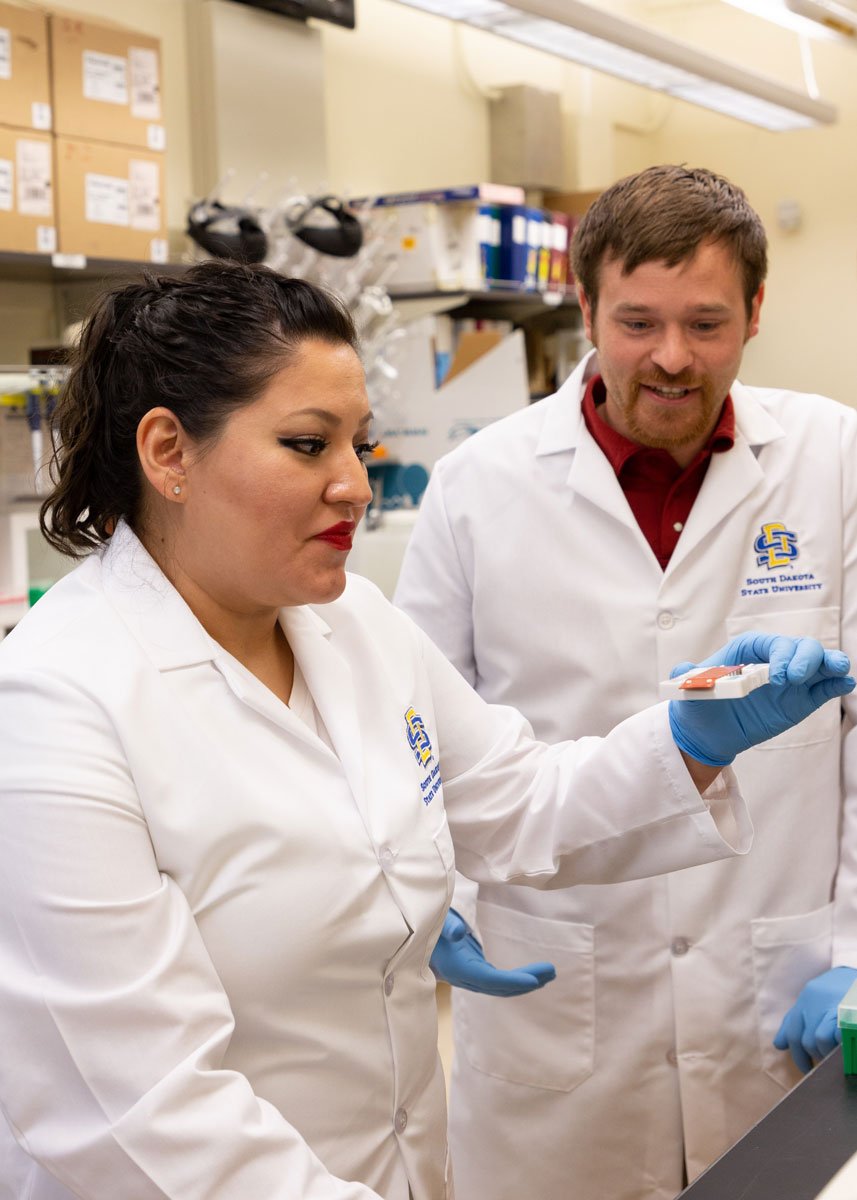A University of South Dakota chemistry major now has experience doing research on jumping genes at South Dakota State University, thanks to a research fellowship program. Jumping genes are DNA segments that are able to replicate and paste themselves into a new position on the same or another chromosome.

This summer, Heather Collazo worked with associate professor Wenfeng An of the SDSU Department of Pharmaceutical Sciences. An and his team are studying how aging affects the regulation of a particular type of jumping gene, known as L1, within body and reproductive cells.
The Future Agriculture and Science Taskforce Research and Extension Experiences for Undergraduates program provides qualifying students a 10-week university laboratory experience the first summer, followed by an industry internship the second summer. Students receive a $6,000 summer stipend through the program, which is in its second year. The program is supported by a four-year, nearly $280,000 U.S. Department of Agriculture grant through the National Institute of Food and Agriculture.
“Heather came into the FAST REEU program with an excellent knowledge of chemistry and an interest in biochemistry. She was up for the challenge of working on cutting-edge genetic research in Dr. An’s laboratory,” said FAST REEU program coordinator Madhav Nepal, an associate professor of biology and microbiology at SDSU.
Collazo, who is an enrolled member of the Navajo nation, was born in Santa Fe, New Mexico, and her family moved to Aberdeen when she was 5 years old.
“This was my first research experience,” said Collazo, who will begin her fourth year in USD’s accelerated master’s program in chemistry this fall. “I have one more year of undergraduate work and then the fifth year will be master’s work.” Collazo plans on applying to a Ph.D. program in biochemistry.
Learning on the job
“The timing was perfect,” An said. Graduate students in An’s laboratory had recently finished harvesting tissue samples from approximately 180 mice, both female and male, at ages ranging from 3 months to 2.5 years, according to postdoctoral research associate Simon Newkirk, who co-mentored Collazo on the project. In humans, the range would be 20 to 80 years old. A full panel is 20 tissues per mouse.
“We needed someone committed to process the samples,” An said. “Heather came in, pulled up her sleeves and got to work. She has done a wonderful job.”
“For me, it’s been like a job—that is the attitude I had coming into it,” she said. With only one undergraduate genetics class under her belt, Collazo set out to learn more about jumping genes. An said, “She reads a lot. In the first week or so, she kept asking, ‘is there anything else I should read?’ That was a very good sign.”
Extracting DNA
The first task was to train Collazo to extract genomic DNA from tissues. Initially, she practiced on control samples, learning to “produce high-quality, reproducible results and get a good yield of genomic DNA from those samples,” An said. Then Collazo began working with the experiment samples from reproductive cells. By the end of July, she had extracted genomic DNA from approximately 260 tissue samples.
The second aspect used digital droplet polymerase chain reaction, or ddPCR, which quantifies the frequency of the L1 insertions. After completing this step, Collazo analyzed the data. She presented her findings at the research team’s weekly lab meeting as well as at a joint poster session for all REEU projects. She will be one of the authors when the results are published in the future.
“The project benefits from her commitment and dedication. We now have a good sense of what’s happening and can design additional strategies or experiments,” An said.
“I learned so much,” she said referring to laboratory skills as well the scientific research process. “This is an invaluable experience, if you come in with an open mind.”
In addition, Collazo sees the Wednesday morning professional development workshops as very beneficial. “A lot of the interpersonal skills you learn are needed to be successful, be it in your career or as you continue your education.” Dean Becky Bott of the Van D. and Barbara B. Fishback Honors College coordinated the weekly life-skills workshops for the FAST REEU scholars.
Students interested in applying for the FAST REEU program can get more information.
Republishing
You may republish SDSU News Center articles for free, online or in print. Questions? Contact us at sdsu.news@sdstate.edu or 605-688-6161.

